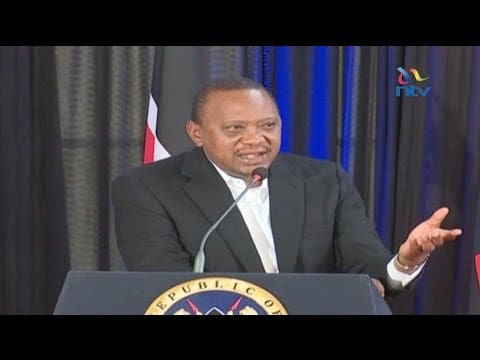
Nairobi, Kenya: Trial Chamber V(i) of the International Criminal Court Wednesday allowed Prosecutor Fatou Bensouda to add two witnesses in the case against President Uhuru Kenyatta.
The court also ordered for the disclosure of the witnesses P-548 and P-66. Uhuru’s defence team had requested to have witnesses disclosed before the trial that is scheduled for November 12 begins.
President Uhuru appears set to do all he can, buoyed by power of his office, to defer or even stop international crimes charges facing him and his deputy at The Hague.
The determination by the President came out last week when Foreign Affairs Cabinet Secretary Amina Mohammed, who is leading the diplomatic effort byKenya through the African Union to defer the cases, declared: “In countries that are considered more advanced than ours, it is clear that presidents are not hauled before the courts and that in many cases, the courts have to wait for their day after the president leaves office. That has been true for many presidents in the North”.
Uhuru’s determination to defer the cases, through AU petition with the United Nations, is also taking a stronger and more strategic approach than his predecessor’s ‘shuttle diplomacy’ spearheaded by former Vice President Kalonzo Musyoka.
Unlike Kibaki who wielded the instruments of power but was not personally linked to the charges, Uhuru is not only the ruler of Kenya but also one of the three suspects, with the second in prominence being his deputy William Ruto.
Behind Uhuru and Ruto are politicians and technocrats helping refine and drive the strategy against ICC, with the most vocal being the Foreign Cabinet Secretary.
Amina who was an Assistant Director General of the United Nations, a step away from the top position of the global body, resigned from her job earlier in the year to join the Jubilee Cabinet.
Her vantage position at UN and international circles is being used as an ‘asset’ by the President and his deputy. She is also familiar with government procedures having previously worked as a Permanent Secretary in the Ministry of Justice.
President Uhuru appears set to do all he can, buoyed by power of his office, to defer or even stop international crimes charges facing him and his deputy at The Hague.
The determination by the President came out last week when Foreign Affairs Cabinet Secretary Amina Mohammed, who is leading the diplomatic effort byKenya through the African Union to defer the cases, declared: “In countries that are considered more advanced than ours, it is clear that presidents are not hauled before the courts and that in many cases, the courts have to wait for their day after the president leaves office. That has been true for many presidents in the North”.
Uhuru’s determination to defer the cases, through AU petition with the United Nations, is also taking a stronger and more strategic approach than his predecessor’s ‘shuttle diplomacy’ spearheaded by former Vice President Kalonzo Musyoka.
Unlike Kibaki who wielded the instruments of power but was not personally linked to the charges, Uhuru is not only the ruler of Kenya but also one of the three suspects, with the second in prominence being his deputy William Ruto.
Behind Uhuru and Ruto are politicians and technocrats helping refine and drive the strategy against ICC, with the most vocal being the Foreign Cabinet Secretary.
Amina who was an Assistant Director General of the United Nations, a step away from the top position of the global body, resigned from her job earlier in the year to join the Jubilee Cabinet.
Her vantage position at UN and international circles is being used as an ‘asset’ by the President and his deputy. She is also familiar with government procedures having previously worked as a Permanent Secretary in the Ministry of Justice.
Kenyan Diaspora Unites to Support Atlanta Family in Health Crisis







